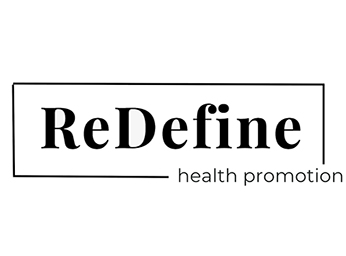“ReDefine Health Promotion”
January 17, 2024 • By Liz Budd, PhD, MPH and Nichole Kelly, PhD • Guest Contributors

Liz and Nichole are academics, researchers and the founders of ReDefine Health Promotion, LLC. Here is the story of the evolution of their work away from a focus on weight loss and toward promoting health through evidence-based, inclusive practices.
We are researchers who have worked to promote physical and mental health in clinical and community settings for nearly 20 years. Like most researchers in the area of health promotion, we were “raised” to intervene with larger bodies. We were trained to frame the problem of inactivity and low fruit and vegetable intake in terms of how these behaviors relate to weight gain, and then how a higher body mass index (BMI) increases risk for chronic disease and premature death. Over time, it became clearer to us that the scientific support for these approaches was lacking, while the scientific support for non-weight-centric approaches was growing stronger.
Even before we began our training, rigorous review studies have pointed out how poorly BMI predicts health outcomes, especially compared to factors like social support, smoking, physical activity, and alcohol and drug use. BMI is particularly bad at predicting health outcomes among marginalized racial and ethnic groups and misclassifies these individuals as cardiometabolically healthy or unhealthy at higher rates than non-Hispanic White individuals.  Additionally, several review studies have consistently found that BMIs in the “overweight” category predict the best health outcomes across the BMI spectrum. More studies have shifted to controlling for BMI rather than treating it as an outcome, and they have found physical activity, dietary intake, and sedentary time each have direct links to chronic disease outcomes regardless of body size. These findings have largely been ignored, yet they are important for two reasons. First, they pinpoint modifiable intervention targets for health promotion. Second, they direct us away from focusing on weight loss, a field of study which has generally produced abysmal long-term results.
Additionally, several review studies have consistently found that BMIs in the “overweight” category predict the best health outcomes across the BMI spectrum. More studies have shifted to controlling for BMI rather than treating it as an outcome, and they have found physical activity, dietary intake, and sedentary time each have direct links to chronic disease outcomes regardless of body size. These findings have largely been ignored, yet they are important for two reasons. First, they pinpoint modifiable intervention targets for health promotion. Second, they direct us away from focusing on weight loss, a field of study which has generally produced abysmal long-term results.
Paralleling our ongoing reconsideration of the link (or lack thereof) between BMI and health, we have also seen a rise in data that document the detrimental roles of weight bias, weight bias internalization, and weight-based discrimination on the health behaviors, physical health, and mental health of diverse populations. Fear of weight-based discrimination, for example, is a significant barrier of exercise in public spaces. It is also one of the most robust predictors of disordered eating and depression. The overwhelming majority of these studies control for BMI, further highlighting how the way people are treated affects their health and well-being more than their body size.
 Both of us were in doctoral programs when we remember noticing, firsthand, that the foci on weight loss and weight gain prevention were working against our research efforts to prevent and treat disordered eating (in Nichole’s case) and promote physical activity enjoyment among girls (in Liz’s case).
Both of us were in doctoral programs when we remember noticing, firsthand, that the foci on weight loss and weight gain prevention were working against our research efforts to prevent and treat disordered eating (in Nichole’s case) and promote physical activity enjoyment among girls (in Liz’s case).
Fast forward to 2016 when we both began our faculty positions at the University of Oregon. We had similar assessments of the evidence and similar yearning to carve a different health promotion path than the weight-centric one that was overwhelmingly the norm. It took us several years to disentangle our work from BMI and weight gain prevention. We began creating non-stigmatizing, health-promoting practices and environments based on what the data show to be the most robust predictors of physical and mental health. We began publishing and presenting research that further underscored the importance of revising common practices and policies that may be good intentioned but promote stigma and deter health. Often resulting from our advocacy work in this area, community organizations and individuals began reaching out to us for help in adjusting their approaches to be less harmful and more helpful to their patients, clients, students, and community members. We created ReDefine Health Promotion, LLC to better serve these community needs and facilitate widespread impact.
With change of any sort, resistance is common. We are pursuing a big change in how we promote health across settings and we do get push back. To some, this shift in our interpretation of the scientific evidence may seem suspicious and raise concerns about the trustworthiness of science in general. But, as scientists, we believe that it is an openness to unexpected findings and deepening understanding of phenomena we previously thought we had figured out that is integral to the scientific approach and, in the end, actually supports its credibility.
So, building on this new evidence base and aiming to enhance effectiveness in our field, we are working to redefine health promotion. We hope you will join us!
CURIOUS TO LEARN MORE?
- ReDefine Health Promotion – Research
-
Budd, E., Kelly, N., & Giuliani, N. (2021, October 11). If you want to support the health and wellness of kids, stop focusing on their weight. The Conversation. http://theconversation.com/if-you-want-to-support-the-health-and-wellness-of-kids-stop-focusing-on-their-weight-168062
- Other media from ReDefine Health Promotion